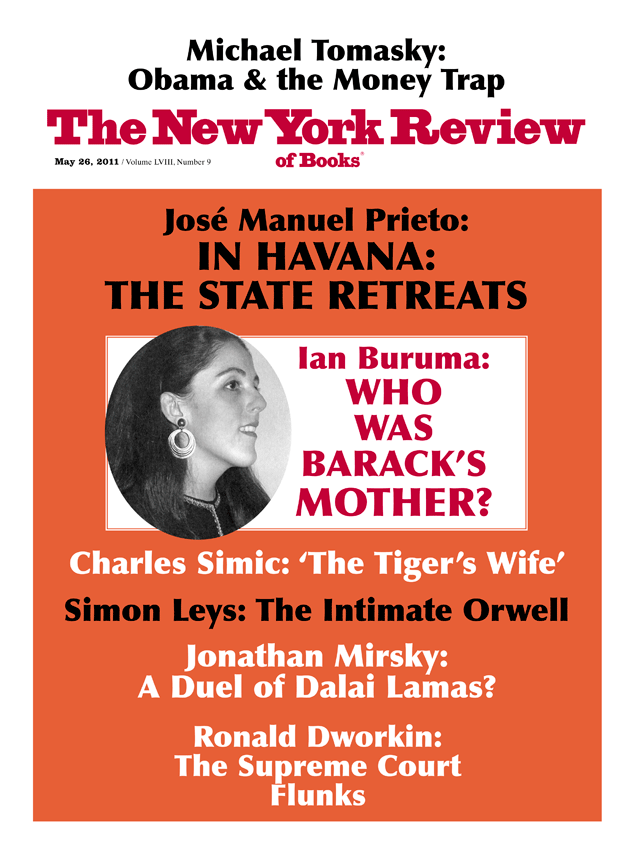In response to:
'For Sorrow There Is No Remedy' from the April 7, 2011 issue
To the Editors:
Julian Barnes’s thoughtful review of my memoir A Widow’s Story [NYR, April 7], buttressed with quotations from Samuel Johnson and C.S. Lewis, culminates in an accusation that in having not clearly stated that I was remarried thirteen months after the death of my husband Raymond Smith, I am open to charges that “some readers will feel they have a good case for breach of narrative promise.”
In retrospect I can see that I should have added something like an appendix, to bring my personal history up to date; yet—(I hope this doesn’t sound disingenuous!)—I would not have thought that my personal history in the aftermath of early widowhood was so very relevant to the subject. A Widow’s Story is perhaps 98 percent journal entries with only two or three conventionally composed chapters, to provide marital background; it was not meant to be an autobiographical work, which would include many, many developments in the memoirist’s life subsequent to the early experience of widowhood, but rather an intimately detailed account of the raw, early weeks and months of “widowhood”—so much of this time is derangement, wild (and pathetic) rationalizing, the constant challenge of “getting through a day”—in segments…
That, at the end of the long and seemingly interminable summer following my husband’s death, I was introduced by a friend to a man who would become my companion and, eventually, my second husband, did not seem that relevant or crucial to the original experience of loss and grief which I was hoping to record in a visceral way unmediated by a retrospective vision. (From the retrospective vision, one might just dismiss all grief as “self-pity”—for what other “self” is there left, to pity? The loved one is gone.)
The hope was to write a widow’s story—one that might find some resonance with other widows in the first half-year or so of widowhood. If a cancer patient were to write a highly detailed, visceral account of her bout with cancer over a period of six months, noting the wide, wild range of emotions, and the small ironies and (even) comic episodes that such an experience might entail, and only suggest that she has been (at least temporarily) declared cancer-free at the end of the memoir, why is this a problem for any reader?
A memoir is most helpful when it focuses upon immediate experience, not a clinical, subsequent summation from what would be the “future” of the individual in the throes of an unpredictable and uncontrollable experience; certainly another memoir might focus upon the recovery and the (temporary?) “after-life.” It is not a charge against grief that it can’t last as pure, raw grief for very long—as one who is tortured, but survives, has not been less tortured because she has survived. To elide the two experiences would violate the actual, literal, “existential” experience of having had cancer, for instance, for the ontological predicament of not-knowing-the-future is inextricable from the experience itself. If one knew beforehand that she would be cancer-free within a year, that would yield a very different sort of perspective.
However, since nothing seems to arouse reproach in reviewers quite so much as the possibility that the memoirist is less miserable at the time of the writing and afterward than she was at the time of the experience about which she is writing, it is only sensible to include an appendix to remedy this, which I will hope to do.
Joyce Carol Oates
Princeton, New Jersey
This Issue
May 26, 2011


